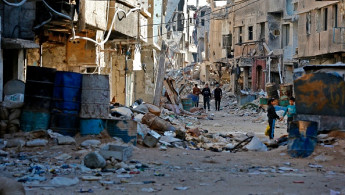Syria regime detains chief suspect in Tadamon massacre
One of the chief suspects in the Tadamon massacre in Damascus is being held by the Syrian regime, a leading Syria monitor has confirmed.
Amjad Youssef, who is accused of killing dozens of civilians, was detained by the Syrian military's notorious branch 227 intelligence agency shortly after footage of the 2013 massacre emerged in late April, the Syrian Network for Human Rights (SNHR) said.
A video of the massacre appears to show Youssef, who was an officer in 227, pushing a man into a hole filled with bodies in Tadamon, a Damascus suburb with a large Palestinian population, before opening fire on the victim.
The videos show the killing of at least 41 civilians at the mass grave, although as many as 288 could have been murdered in the massacre, including women and children.
It is believed to be some of the strongest evidence of massacres committed by the Assad regime, which is responsible for the vast majority of the half a million killed in the Syrian war.
The regime has been careful to conceal evidence of dozens of massacres in the war, including killing or detaining witnesses and journalists.
During an investigation into the massacre, Youssef allegedly confessed to the killings and to raping women.
Fadel Abdul Ghany, chairman and founder of the SNHR, told The New Arab that Youssef's detention confirms that responsibility for the massacre goes up to the highest levels of the Syrian intelligence and that the regime might seek to cover up its crimes by liquidating witnesses.
"If Amjad Youssef was not deeply involved in those horrific operations of arbitrary arrests, torture, killings, then the Syrian regime would not arrest him," said Abdul Ghany.
"Amjad Youssef is just one small tool in the regime intelligence and this [arbitary arrest] indicates that the highest ranks are deeply involved in these crimes. It has made the regime concerned that more information will be revealed about the highest ranks, including the chief of the armed forces, Bashar Al-Assad, [being involved]."
Abdul Ghany said the detention of Youssef and the massacre itself have sparked concerns about the fate of tens of thousands of other detainees held by the regime, many arrested for taking part in peaceful protests in 2011.
At least 80,000 detainees are held by the regime, according to the SNHR, while others believe the number is as high as 150,000. Many are feared dead from torture, executions, starvation, and disease.
The Syrian regime has murdered many thousands of civilians, such as in the Houla Massacre in 2012, during its fightback against the opposition.
Abdul Ghany said that the Syrian regime has promoted intelligence officers - such as Youssef - and militia leaders responsible for these mass killings, tying the fate of these men to the survival of the Assad dynasty.
"The regime did not hold accountable or arrest any of thousands of other Amjad Youssefs; they did not hold one member or officer of the intelligence accountable [for the massacres]," he told The New Arab.
"The regime's strategy has not only been to protect the perpetrators but also promote them... the regime wants their fates to be merged together with theirs."
Youssef's downfall is likely due to him unwittingly revealing the scale of the regime's brutality, as Assad seeks to normalise relations with the rest of the world.





 Follow the Middle East's top stories in English at The New Arab on Google News
Follow the Middle East's top stories in English at The New Arab on Google News


![MP Essam Diab's pursuit to block TikTok in Egypt has revived an already ongoing debate in the country. [Getty]](/sites/default/files/styles/image_330x185/public/1230748046.jpeg?h=a5f2f23a&itok=-8MqBLLC)